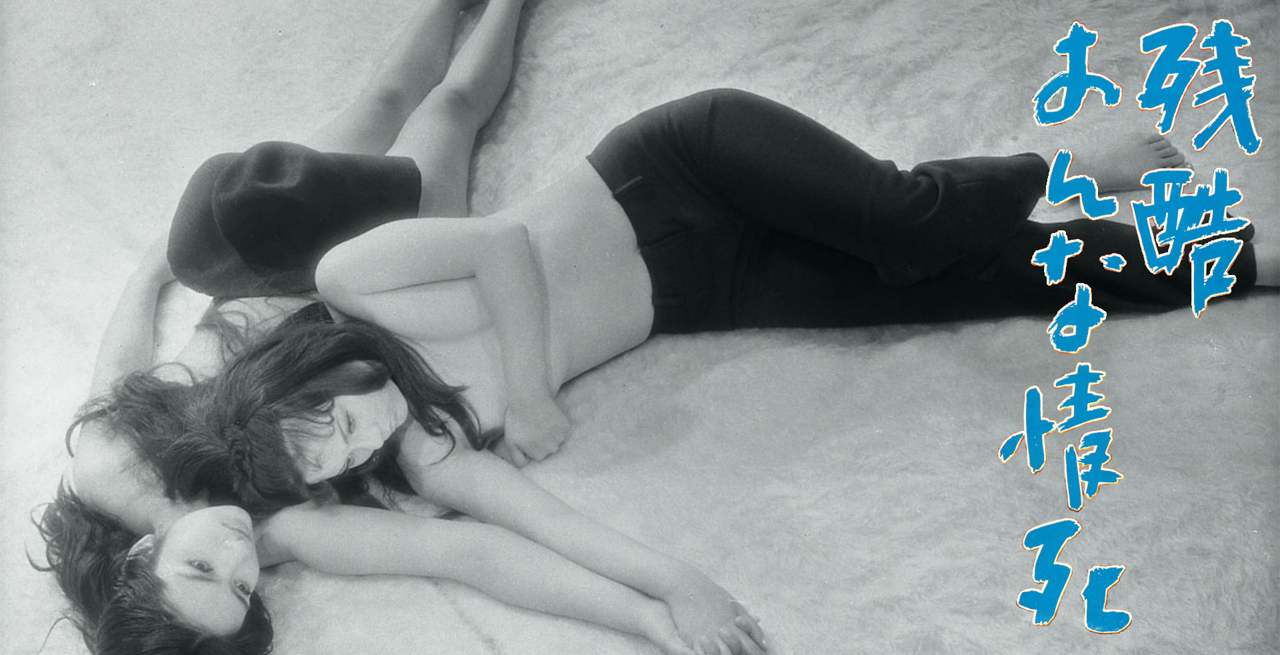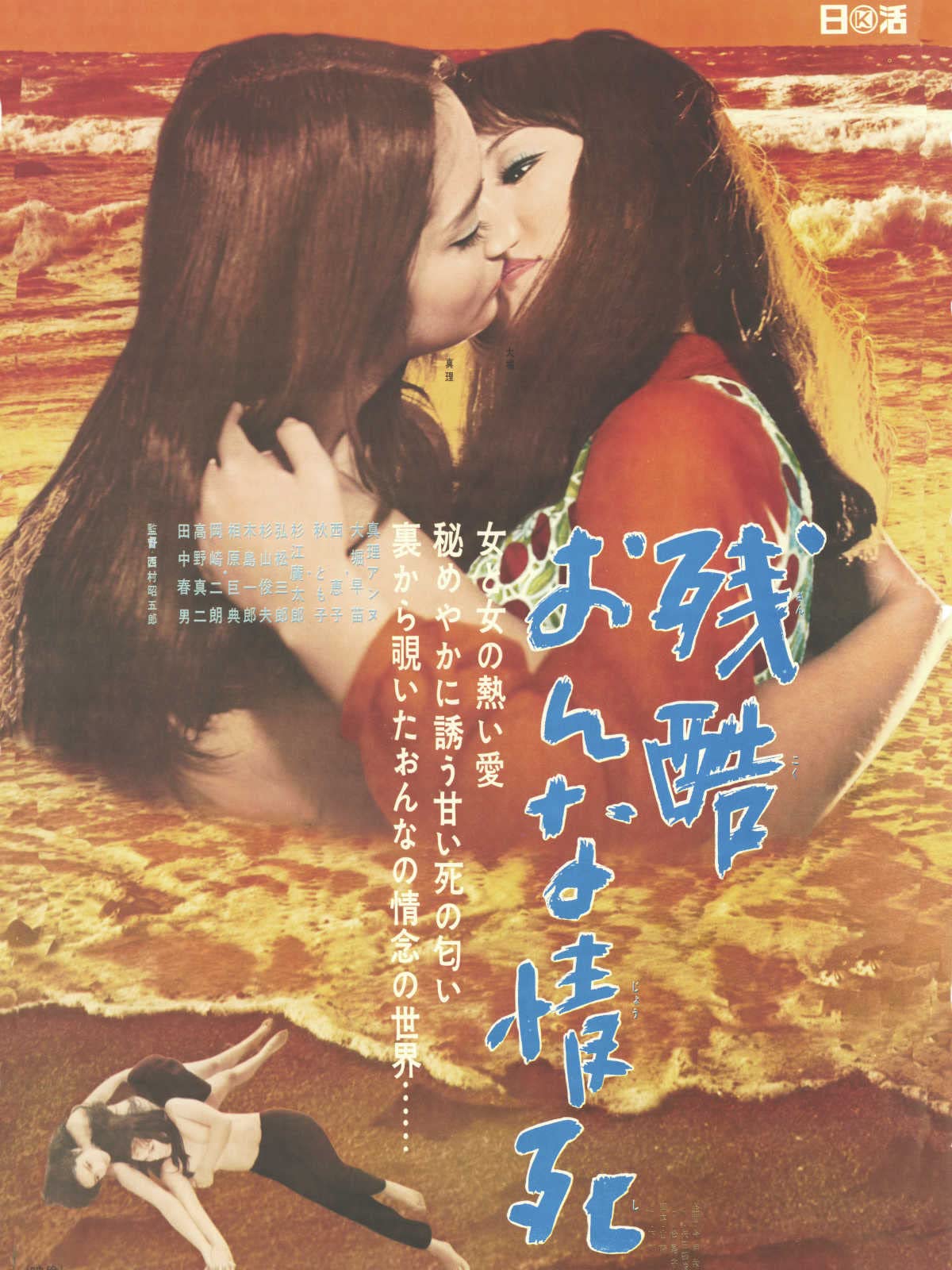
c
Despite being Japan’s oldest film studio, Nikkatsu by the late 1960s was struggling: with TV quickly becoming the go-to source of entertainment, ticket sales for films were at an all-time low. In order to compete with TV, Nikkatsu needed something that couldn’t be broadcast, and their attention, like many other studios at the time, turned to exploitation and the erotic. This eventually culminated in 1971 with the creation of Roman Porno – Nikkatsu’s massively popular line of softcore pornographic films which arguably saved the studio.
That’s not to say that Nikkatsu didn’t explore those themes before 1971; Roman Porno was simply a natural progression of their existing focus on erotic romance. A key entry of this transitional period came in 1970 with Cruel Woman’s Love Suicide. Devised as a follow-up to the 1969’s sukeban film Cruel Woman’s Lynching (notable for making a star of Meiko Kaji), Cruel Woman’s Love Suicide, like the former, was written by Iwao Yamazaki. Taking the director’s chair was Shogoro Nishimura, regarded as the godfather of roman porno, and this would be his final film prior to the launch of roman porno with Apartment Wife: Affair In the Afternoon.

The film begins with a young woman, Chiei (Sanae Ohori), hopping off a bus in the fashionable Tokyo district of Shinjuku with only a two bags and a head full of dreams accompanying her. Chiei is not one to plan ahead and has nowhere to stay with hardly a penny to her name, so she deems the best solution is to find a sucker to bankroll her new adventure. After latching on to a middle-aged salaryman at a casino, she allows him to take her to a bar and buy her drinks all night, before eventually accompanying him to a hotel room. She is incredibly reckless and doesn’t think for a second of the danger she could have put herself in her drunken state. She quickly jumps into bed to go to sleep, seemingly unaware that the man hasn’t just rented the room out of selfless charity. Fortunately for Chiei, before the man has a chance to force himself upon her, an injured woman (Annu Mari) bursts through door. The man is spooked and runs off, leaving the woman slumped unconscious on the floor and Chiei to deal with the situation herself. To her surprise, the woman is none other than an old school friend called Maiko, and it is revealed that she has taken an overdose of sleeping pills in an effort to commit suicide.
After helping her home in the middle of the night, Chiei is surprised at Maiko’s expensive and luxurious apartment which is filled with the finest and most fashionable furniture. Maiko lives in the apartment with her gangster boyfriend, and occasional pimp, Eiji (Jiro Okazaki), and they allow Chiei to stay with them for as long as she needs. With Maiko bedridden after her suicide attempt, her place at the bar where she works needs filling, and the yakuza owners make it very clear to Eiji that he needs to fill that position at all costs. Seeing the naïve and freeloading Chiei as a good candidate, he convinces her to fill in for Maiko, leaving out the details of how she will be expected to go home with patrons if ordered to. A few days later, Eiji lets her know about an occult-themed masquerade sex party. At the party, the guests are encouraged to remain silent and wear KKK-style robes to completely hide their identities. When Chiei is chosen by a mystery partner she has no idea that it is actually a woman and has her first experience of lesbian sex. After discovering that her partner was actually Maiko, a deep desire is ignited and she obsessively pursues a relationship with her.
Exploited and disgusted by her boyfriend as she is shared out to yakuza thugs, Maiko eventually finds comfort in Chiei’s arms. A passionate love affair sparks between the two women, though they are forced to hide their forbidden relationship behind closed doors, sneaking every tiny opportunity possible to be together. When they are eventually found out, they not only have to deal with Maiko’s jilted boyfriend but also his yakuza superiors who are less than thrilled by the absence of their top call girl. The women must fight against forces not only trying to split them apart but also murder them, with their burgeoning love seemingly destined for tragedy.

As seen with his older film Three She-Cats, writer Iwao Yamazaki was clearly talented at writing independent and boisterous young female characters, with Chiei fitting that archetype well. Perhaps most interesting, however, is the character of Maiko who is visibly traumatised by her abuse at the hands of Eiji and the yakuza, being forced into the life of a call girl. She withdraws inside herself as a coping mechanism, showing a hard-faced emotionless shell to the outside world, as internally she is consumed by depression and despair. She is disgusted by men and can only stomach having sex with them by completely disconnecting from reality and imagining herself on a deserted beach. On the rare occasions that her true feelings are coaxed out by Chiei, her passion is explosive and uncontrolled; at times even surprisingly violent, especially when expressing herself sexually. Chiei on the other hand is manic, emotionally unpredictable, and prone to outbursts of intense hysteria – very much the polar opposite of Maiko.
With such extreme ends of the emotional spectrum represented by the film’s two protagonists it has to be said that at times, whether intentionally or not, the portrayals of Chiei and Maiko begin to fall into the stereotypical depiction of lesbians as neurotic – a common staple of homosexual representation throughout history. When presented with such chaotic characters, the cast struggles with capturing the correct tone and nuance. The usually impressive Annu Mari often underacts throughout the film, appearing to be more bored than tortured. Sanae Ohori, in her first major starring role, has clear difficulties in judging Chiei’s mood from scene to scene which makes her already unpredictable character feel alien and unrealistic.

Despite its memorable characterisation, not much effort is put into showing the women’s true feelings for each other. The portrayal of their love affair relies instead on random smatterings of hurried sex scenes followed up by laborious dialogue deliveries where each character painstakingly lays out their thoughts and emotions for the audience. There are certainly some interesting facets of their relationship: whilst in many ways the two women clearly benefit each other, they also highlight and amplify each other’s toxic traits. Unfortunately, the audience is left to fill in the gaps of this depth as it goes largely unexplored, instead relying almost entirely on physical expression. It is ultimately clear that the filmmakers were fairly out of their depth when trying to portray a realistic look at lesbian love – though to Shogoro Nishimura’s credit, he avoids the pornographic lens when depicting lesbian sex.
Much of the runtime, instead of expanding on the women’s relationship, is dedicated to the generic yakuza side plot, with the film obviously feeling that overt villains were necessary. It generally feels out of place and only seems to exist in order to provide threats of sexual violence whenever the story requires grounding and momentum. With the title of “Cruel Woman’s Love Suicide”, there is no doubt of where the film will end up and this becomes an albatross around the film’s neck. Locked into a tale that is destined to end in tragedy, the plot is compelled to deprive its characters of any semblance of a happy ending. The final act in particular feels downright sadistic featuring practically non-stop punishment of its protagonists.
Somewhat sprawling and unfocused for the most part, Cruel Woman’s Love Suicide certainly builds a grimy and oppressive urban atmosphere where exploited women are only able to find comfort in each other’s arms. However, despite its unique subject matter, the film never lets its characters truly blossom and instead uses a yakuza subplot to subdue and wrestle the story of lesbian love into a noir-tinged melodrama.
More Film Reviews
It Doesn’t Breathe…It Doesn’t Move…It Just Kills Don’t Look Away (2023) is the story of Frankie (Kelly Bastard) and her possible descent into madness after she accidentally strikes and kills… TikTok dances emanate eerily around you, a cacophony of booming cackles emit from influencers as they forcefully push their latest merch (that was most likely made in some far-off, exploitative… Jishu eiga, abbreviated from jishu seisaku eiga and translating roughly to “autonomously produced”, is an elusive, self-sufficient form of filmmaking popularised during the decline of mainstream Japanese cinema around the… The international shorts on offer at this year’s Toronto After Dark Film Festival are among the strongest of the entire lineup. From a bizarre reunion with a lost family member… Imagine if, in the early 1980s, nascent film directors John Hughes and Wes Craven met up with venerable science fiction author Ray Bradbury at a Northern California artist’s retreat. There,… Techno-horror is a fertile subgenre. Since technology constantly evolves, so must our relationship to it. Our increasingly teach-reliant existence offers countless angles from which to tackle what are, essentially, cautionary…Don’t Look Away (2023) Film Review – If You Thought Mannequins Were Creepy Before…
#Chadgetstheaxe (2022) Film Review – Cancel Culture Gone Awry (Unnamed Footage Festival 666)
Crazy Thunder Road (1980) Film Review – Cyberpunk Biker Action
TADFF 2023 International Shorts Feature [Toronto After Dark Film Festival]
Detention (2011) Film Review – Never Going Back to My Old School
DIGITAL VIDEO EDITING… (2020) Film Review | Learning to Kill Your Darlings (Unnamed Footage Festival 666)

Hi, I have a borderline obsession with Japanese showa-era culture with much of my free time spent either consuming or researching said culture. Apparently I’m now writing about it as well to share all the useless knowledge I have acquired after countless hours surfing the web and peeling through books and magazines.



![TADFF 2023 International Shorts Feature [Toronto After Dark Film Festival]](https://www.grimoireofhorror.com/wp-content/uploads/2023/10/TAD23_IntlShorts_1920x1080-1-365x180.jpg)

